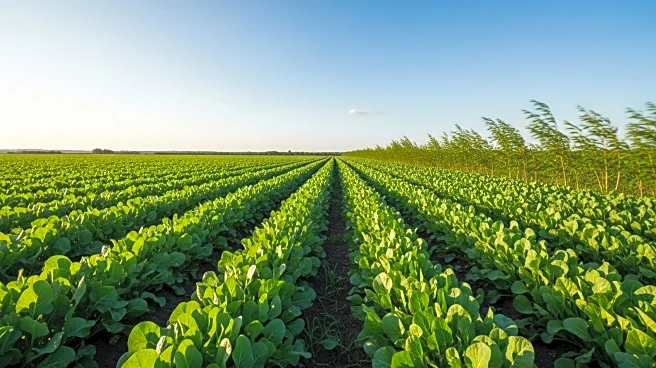What's Happening?
The global organic farming market is experiencing substantial growth, projected to increase from $7.05 billion in 2024 to $22.7 billion by 2032. This growth is driven by changing consumer preferences, government initiatives, and the rising importance of sustainable agriculture. Organic farming emphasizes avoiding synthetic fertilizers, pesticides, and genetically modified organisms (GMOs), focusing instead on natural inputs and sustainable cycles. Government policies worldwide are supporting this shift, with subsidies, grants, and tax credits encouraging farmers to adopt organic methods. Certification systems like USDA Organic and EU Organic logos enhance consumer trust, while initiatives in countries like India empower smallholder farmers to transition to organic practices.
Why It's Important?
The expansion of the organic farming market reflects a broader shift towards sustainable agriculture, which has significant implications for environmental health and consumer safety. As consumers become more aware of the health risks associated with conventional farming practices, the demand for organic products is increasing. This trend is supported by demographic shifts, with millennials and Gen Z prioritizing sustainability and ethical consumption. The integration of biological solutions and precision agriculture technologies is further enhancing the efficiency and productivity of organic farming. This growth not only benefits consumers seeking healthier food options but also supports environmental conservation efforts by reducing soil and water pollution and protecting biodiversity.
What's Next?
The organic farming market is expected to continue its growth trajectory, with Europe leading the way due to strong consumer demand and supportive government frameworks. The Asia-Pacific region is anticipated to witness the fastest growth, driven by population growth and increasing food demand. In the U.S., the organic market remains significant, with ongoing government support and consumer interest. As the market expands, companies are likely to invest in research and innovation to meet the growing demand for organic products. The future of organic farming will be shaped by consumer demand for clean-label foods and sustainability-focused government regulations.
Beyond the Headlines
The rise of organic farming highlights the intersection of technology and traditional agricultural practices. The use of precision agriculture tools, such as drones and IoT devices, in conjunction with biological inputs, is transforming the efficiency and environmental impact of farming. This trend underscores the potential for technology to enhance sustainable practices and support the global shift towards more environmentally responsible agriculture.









